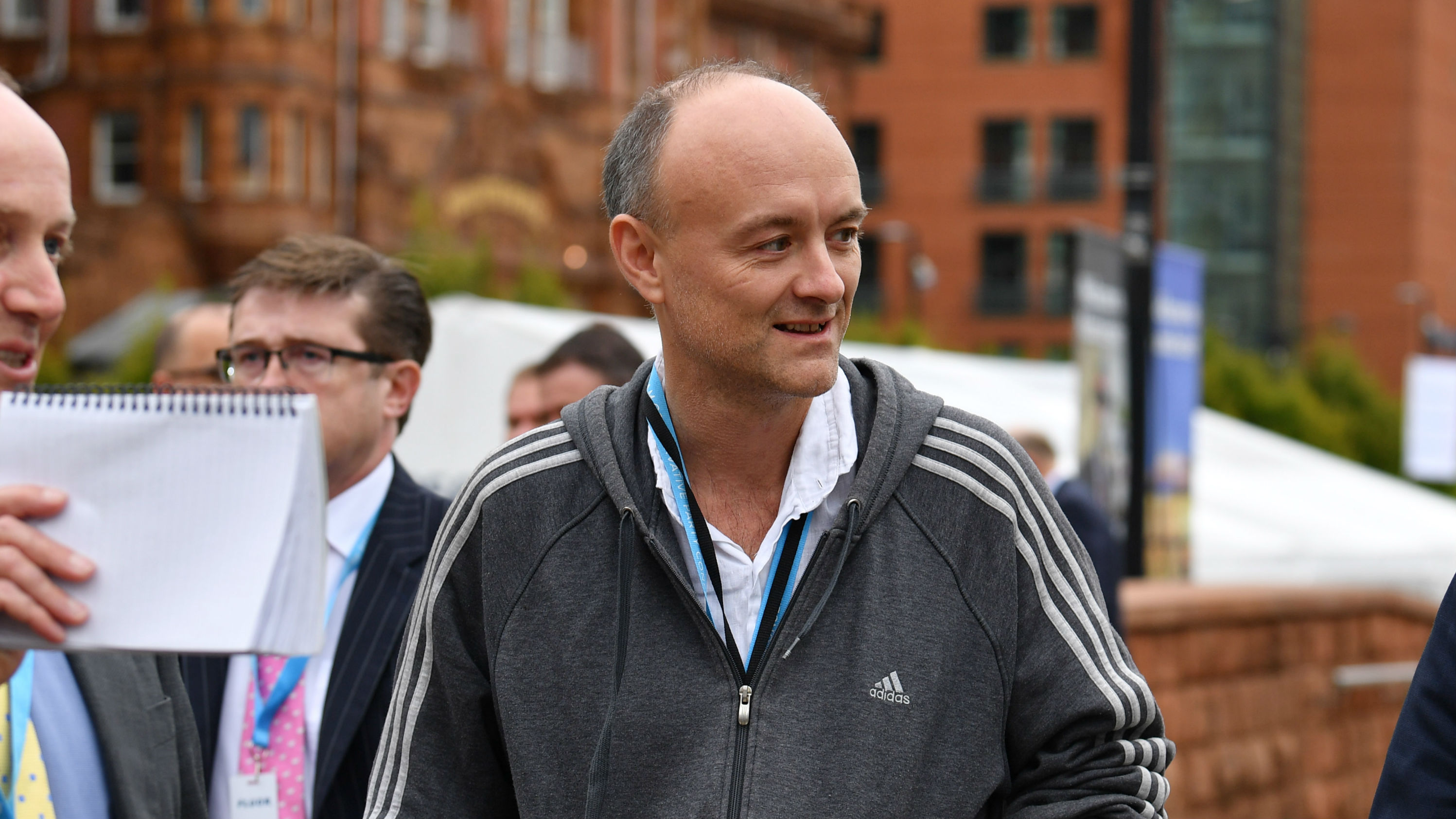Instant Opinion: Dominic Cummings’s critics ‘simply deluded’
Your guide to the best columns and commentary on Friday 1 May

A free daily email with the biggest news stories of the day – and the best features from TheWeek.com
You are now subscribed
Your newsletter sign-up was successful
The Week’s daily round-up highlights the five best opinion pieces from across the British and international media, with excerpts from each.
1. Philip Collins in The Times
on unfair attacks on the PM’s closest advisor
The Week
Escape your echo chamber. Get the facts behind the news, plus analysis from multiple perspectives.

Sign up for The Week's Free Newsletters
From our morning news briefing to a weekly Good News Newsletter, get the best of The Week delivered directly to your inbox.
From our morning news briefing to a weekly Good News Newsletter, get the best of The Week delivered directly to your inbox.
Dominic Cummings’s critics are simply deluded
“The government and its critics have colluded in the deceptively simple idea that political decisions and scientific advice are different things. Ministers insist they are following the science; critics counter that they are not. Any hope that lockdown would usher in a more civilised political debate has vanished as the critics of austerity replay all their old tunes. Slowly, the Brexit tribes are regrouping to expend their residual anger on a government they claim is pursuing cod-Darwinian population control or, at best, mere quackery... Indeed, the presence of Mr Cummings on Sage contradicts the simplistic view of his critics because it shows that politics and science mesh right at the top. In fact, they mesh all the way down. Scientists, like politicians, approach their experiments with preconceived ideas. ‘There is no such thing as philosophy-free science,’ says Daniel Dennett in Darwin’s Dangerous Idea.”
2. Andy Beckett in The Guardian
on the contemporary echoes of Harold Macmillan
A free daily email with the biggest news stories of the day – and the best features from TheWeek.com
A cavalier Tory leader and a botched pandemic response? It must be 1957
“For Johnson’s critics, the fate of Macmillan’s government in the aftermath of the 1957 pandemic is not a reassuring precedent. During the later months of the crisis – not a point the government has reached yet – the Tories’ poll ratings did fall sharply. But by the time the next general election came, in 1959, the pandemic had receded. The Labour manifesto didn’t even raise the government’s handling of it. The Conservatives talked up their economic record instead, and won easily, increasing their Commons majority to 100. In Britain, it remains disconcertingly easy – and a sign of how lopsided our democracy is – for Tory governments responsible for disasters to change the subject. The rightwing bias of the press, worse now than in the 1950s, as there are fewer left-leaning papers, is the obvious villain. But equally important is a reluctance from voters to face up to the sheer scale of what the Conservatives have sometimes got wrong.”
3. Tim Hartford in the Financial Times
on the link between coronavirus-control and climate change
Saving the planet demands sacrifices just as Covid-19 does
“The virus has taught us that our way of life is more vulnerable than we might hope. It has taught us the importance of making sacrifices now to prepare for predictable risks in the future. It may even have reminded us that driving to work, or flying half way around the world for a meeting, are not always necessary, and of the joys of walking or cycling through quiet streets. These lessons may help us deal with the threat of climate change that still looms over us. But my friends in the environmental movement should take one more lesson to heart: if degrowth is the only solution we can find to our problems, perhaps we haven’t looked hard enough.”
–––––––––––––––––––––––––––––––For a round-up of the most important stories from around the world - and a concise, refreshing and balanced take on the week’s news agenda - try The Week magazine. Start your trial subscription today –––––––––––––––––––––––––––––––
4. Ian Hamilton, associate professor of addiction at York University, in The Independent
on the fast dissipation of goodwill
Goodbye big society - already we are seeing a return to looking out for number one
“Seductive as it is to believe that Covid-19 is the great leveller, it is not. The pandemic has in effect widened another rift that was alive and well pre-pandemic: that of class and inequality. Low-paid shopworkers, porters, cleaners and so on all have maximum exposure to the virus and the least state support in return for that risk. The middle class stay shielded, spending their time learning a new language or some other form of self-improvement that must be despairing to hear about if you don’t have equal economic, social or psychological capacity and you’re struggling to survive... Predictions about how life would be radically different after Covid-19 – that we would be more cohesive as a society – are beginning to look overly optimistic. Indeed, we are already returning to our old ways of looking out for number one.”
5. Gavin Mortimer in The Spectator
on simmering discontent across the Channel
Emmanuel Macron is experiencing the calm before the storm
“All in all, I reckon I’ve had a good ‘war’, as have in general the French, a point made last week by Christophe Castaner, the interior minister, who praised the country’s discipline [during lockdown]. I can’t help thinking, however, that president Macron’s problems will really start post confinement. France has plunged into recession as its GDP contracted by 5.8 per cent in the first three months of 2020, the worst contraction since the second war. With such a grim outlook it’s probably just as well the police have had their feet up these past seven weeks because also making the most of the unseasonably good weather have been the anarchists, extremists, unionists, opportunists and yellow vests.”
-
 How the FCC’s ‘equal time’ rule works
How the FCC’s ‘equal time’ rule worksIn the Spotlight The law is at the heart of the Colbert-CBS conflict
-
 What is the endgame in the DHS shutdown?
What is the endgame in the DHS shutdown?Today’s Big Question Democrats want to rein in ICE’s immigration crackdown
-
 ‘Poor time management isn’t just an inconvenience’
‘Poor time management isn’t just an inconvenience’Instant Opinion Opinion, comment and editorials of the day
-
 ‘Irony’ as Zoom calls staff back to office
‘Irony’ as Zoom calls staff back to officefeature And other stories from the stranger side of life
-
 The U.S. veterinarian shortage crisis
The U.S. veterinarian shortage crisisSpeed Read With an anticipated shortage of 15,000 vets by 2030, it will be harder to get care for pets
-
 How the world reported French riots over shooting of teenage boy
How the world reported French riots over shooting of teenage boyfeature Violence has ripped through French suburbs in days following death of Nahel M.
-
 Boris Johnson shocks UK by resigning from Parliament
Boris Johnson shocks UK by resigning from ParliamentSpeed Read
-
 Company teaches mask-wearers to smile again
Company teaches mask-wearers to smile againfeature And other stories from the stranger side of life
-
 Bees delay flight for three hours
Bees delay flight for three hoursfeature And other stories from the stranger side of life
-
 French minister sparks anger with Playboy cover
French minister sparks anger with Playboy coverSpeed Read Marlène Schiappa gave interview on women’s and LGBTQ+ rights – photographed fully clothed in white dress
-
 France after Macron: can anything stop Marine Le Pen?
France after Macron: can anything stop Marine Le Pen?Today's Big Question Analysts believe the far-right leader may be the biggest political beneficiary of popular fury over President Macron’s pension reforms